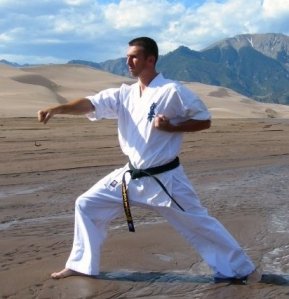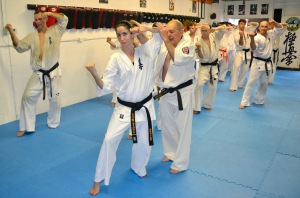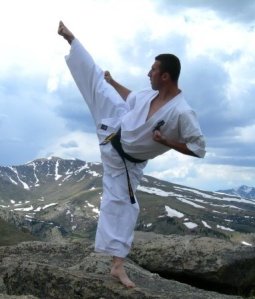I returned to class last night after being off for a week with the flu. It felt good being active again, but it’s incredible how quickly we lose gains when away. After only one week I could already feel a decrease in stamina, strength, etc.

The class last night focused on kihon, and I loved it. It forces concentration on the small details, and I love working on those parts. I’m not sure why, but there is something inside me to want to perfect kata and kihon. There is just something about seeing perfectly executed kata and basics that excites me, as much as watching kumite.
Sensei Fogarasi made comments about the importance of kihon and I know there are those who dread the basics, but I agree with him that they are the foundation of everything we do. The building blocks of everything else.
Though we all make jokes about it, we all remember The Karate Kid, specifically when Mr. Miyagi instructs Daniel-san to wash his cars and “wax on/wax off”. Pushing Daniel-san to the brink of utter frustration. Mr. Miyagi finally shows the value of basic training and fundamentals, by demonstrating to Daniel-san the instinctual movement that has been drilled. It also showed the commitment, which was expected by instructors years ago.
As much as we laugh, we know that this is the type of commitment, which makes a great karate-ka. It is the foundation of all. Through practice and hard work, we continue to build upon the foundation, to build the structure of our house, our karate.

I recently saw an interview with Hajime Kazumi , conducted by Nicholas Pettas for the program Samurai Spirit. Kazumi has become one of my favourite karate-ka, for numerous reasons. He won the All Japan an incredible 5 times! A record that still stands. So I was shocked to hear in this interview that he believes that karate is all about kata.
https://www.youtube.com/watch?v=_QpxrA01mqs

In my dojo, every step, stance and hand movement is critiqued, and last night I loved learning a kata that I didn’t know before. Getting lost within the turns, looking to the higher ranks to find my place and keep up.
 There is something about the energy of kata. You feel grounded and powerful. I get lost in it sometimes, and forget about time. It becomes meditative. I stop and realize I’ve been going over and over one small section, without realizing it. It can become exasperating when you work on one aspect, but continue to make mistakes.
There is something about the energy of kata. You feel grounded and powerful. I get lost in it sometimes, and forget about time. It becomes meditative. I stop and realize I’ve been going over and over one small section, without realizing it. It can become exasperating when you work on one aspect, but continue to make mistakes.
Such as being in the right angle and position when blocking. Exasperated, but driven to perfect it, knowing there is no perfection.
For me, kihon and kata are the soul of karate, and I feel blessed to be at a dojo where the instructor values and puts so much emphasis on these aspects as well.

I just love reading and watching videos of karate. I live for this art. I feel it inside of every fiber of my being. To be honest, I don’t think I’d be able to put into words how karate is everything good for me. I agree with you that the base of karate lies in kihon and kata. It is in everything we do. I’m 22 years old and when I was around 8 or 9 years old, my mom signed me up to learn Kyokushin karate. My brother stopped training, but I continued. We had the kihon written on… Read more »
[…] days before testing so I assumed it would be a lot of kata, kihon, etc., but instead we worked on our […]
[…] Drilling. Basics. Kihon. I have said it before, I know there are some who are bored or dread this type of work, but I love it and live for it. I […]
Thank you. I grew up in London UK. Studied Kyokushinkai Karate, for seven year’s. Taught at several London Dojos.’ In 1968 Mas Oyama came to London visiting Steve Arniel and Bob Bolton, both my instructors. I made Shodan, during that visit. Moved to Nassau Bahamas in 1971 and durring 1974 met an Isshin-Ryu, Okinawan Karate practitioner from America, we became best friend’s, and one year later I moved to the US, to study his style with him and his instructor in Miami. My friend is still my teacher and we both ‘practise’ daily… (we live in different town’s) we to… Read more »